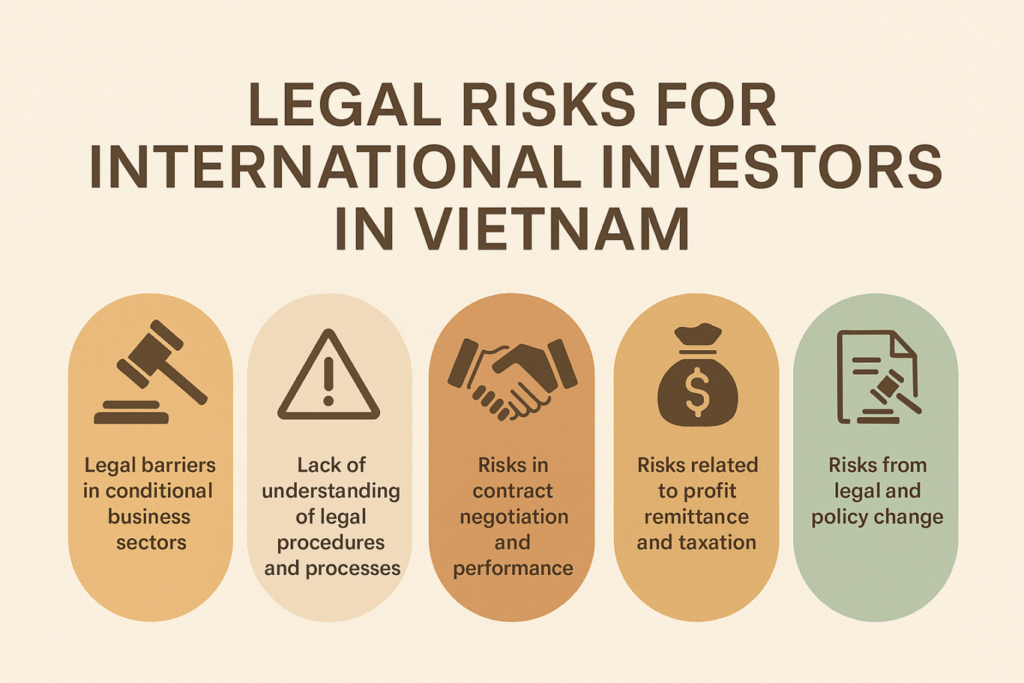Vietnam is emerging as an attractive destination for international investors, thanks to its stable economic growth, young population, and open integration policies. However, alongside these promising opportunities, foreign enterprises must remain cautious of legal risks that may impact the effectiveness and sustainability of their investments in Vietnam.
1. Legal barriers in conditional business sectors
Vietnam imposes specific conditions on foreign investment in certain sectors, including foreign ownership caps and requirements for local partnerships. Without thoroughly reviewing the list of conditional sectors prior to investment, businesses may face rejection of their investment registration certificate or be forced to restructure after operations have begun.
Moreover, misidentifying the business sector can lead to serious legal consequences such as license revocation, administrative penalties, or missed market opportunities. Therefore, legal due diligence on business activities is a critical step before launching any investment project.
2. Lack of understanding of legal procedures and processes
The investment process in Vietnam involves multiple stages—from investment registration and enterprise establishment to obtaining construction, environmental, and fire safety permits. A lack of clarity on procedures and timelines can delay project implementation or disqualify a company from continuing operations.
Vietnam’s legal system is still evolving, with overlapping and inconsistent regulations across various laws and local authorities.
Without guidance from a Vietnam law firm, foreign investors may face confusion due to a lack of clarity on procedures and timelines. This can delay project implementation or even disqualify a company from continuing operations.
3. Risks in contract negotiation and performance
Differences in legal systems, languages, and business cultures pose significant risks during contract drafting between foreign investors and local partners. Contracts lacking clear provisions on obligations, payment terms, breach handling, or dispute resolution mechanisms can easily result in misunderstandings and disputes.
Additionally, many foreign businesses fail to anticipate legal issues that may arise during contract execution, such as changes in the law, policy adjustments, or partner non-compliance. Without a solid legal strategy embedded in the contract, investors risk losing control over projects and incurring financial losses.
4. Risks related to profit remittance and taxation
Although Vietnamese law allows foreign investors to remit profits abroad after fulfilling tax obligations, in practice, the process can be delayed due to insufficient documentation, audit complications, or foreign exchange management issues. These delays can directly affect liquidity and financial planning for parent companies overseas.
Furthermore, Vietnam’s tax policy is increasingly strict on transfer pricing, related-party transactions, and unwarranted tax incentives. Failure to prepare complete tax documentation or keep up with new tax regulations may result in back taxes, late payment penalties, and damage to a company’s legal reputation.
5. Risks from legal and policy changes
Vietnam’s legal environment is frequently updated, particularly in areas related to investment, land, environment, and labor. These changes can have direct impacts on project operations or profitability, especially when new laws apply retroactively or lack a clear transition period.
There have been many cases where businesses faced project delays or had to alter their business models due to regulatory changes. To mitigate such risks, investors should establish a legal monitoring system and regularly consult with local legal advisors to ensure timely and strategic compliance.
The sustainable solution for foreign investors is a combination of comprehensive legal due diligence prior to entry, reliance on local legal experts familiar with current policies, and the maintenance of an effective internal compliance system. Only by understanding and managing legal risks can investors fully leverage Vietnam’s market potential.
ASL Law is a leading full-service and independent Vietnamese law firm made up of experienced and talented lawyers. ASL Law is ranked as the top tier Law Firm in Vietnam by Legal500, Asia Law, WTR, and Asia Business Law Journal. Based in both Hanoi and Ho Chi Minh City in Vietnam, the firm’s main purpose is to provide the most practical, efficient and lawful advice to its domestic and international clients. If we can be of assistance, please email to [email protected].
ASL LAW is the top-tier Vietnam law firm for Investment Services. If you need any advice, please contact us for further information or collaboration.

 Tiếng Việt
Tiếng Việt 中文 (中国)
中文 (中国) 日本語
日本語

